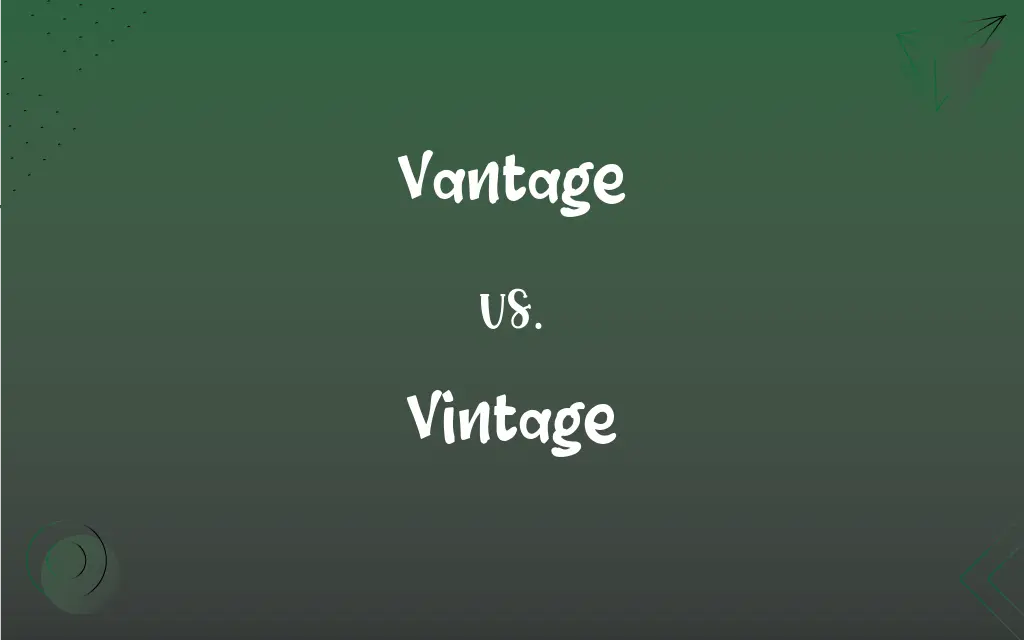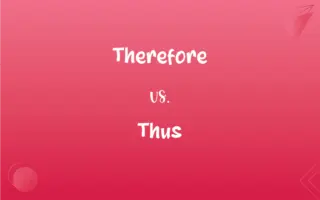Vantage vs. Vintage: What's the Difference?
Edited by Aimie Carlson || By Harlon Moss || Updated on November 2, 2023
"Vantage" refers to a position giving a strategic advantage, while "vintage" relates to the year or quality of wine or the age/style of items.

Key Differences
"Vantage" refers to a place or position affording a good view of something or a strategic advantage in a situation. The term "vintage," however, is typically associated with the year of wine production or its quality and can extend to indicate the high quality or classic nature of an item, especially from a past era. In everyday language, vantage is about position, while vintage is about time and quality.
One might seek a vantage point to view a landscape or gain an advantage in competition, indicating the strategic importance of position or perspective. On the contrary, vintage items, such as wine or clothing, are valued for their classic qualities and age, often carrying connotations of being collectible or of enduring interest. Vantage speaks to location, while vintage speaks to history and quality.
The word vantage can be used metaphorically to describe an advantageous condition in various contexts, such as in business or personal life: having a vantage in negotiations. Vintage, however, is used to refer to the period during which something was made or to denote its enduring appeal, suggesting a quality that withstands the test of time, such as vintage fashion.
Vantage emphasizes the benefit of a position or situation. For instance, in a debate, having the vantage could mean having an argument that provides an upper hand. Vintage, in a similar discussion, could refer to a perspective or idea that has been cherished over time, likening it to a classic or time-honored argument.
In summary, vantage is about gaining superiority through position or situation, whereas vintage refers to the age-related quality or year of production of an item, especially with respect to wines or antiquities. Vantage is a strategic asset, while vintage is a hallmark of age and often quality.
ADVERTISEMENT
Comparison Chart
Primary Meaning
Strategic position or advantage
Year of production or age-related quality
Contextual Usage
Viewpoints, competitive edge
Wine, classic items, period styles
Connotation
Advantage, superiority
Quality, age, nostalgia
Metaphorical Use
Advantage in any situation
Enduring appeal or quality
Relationship
To location or situation
To time or production era
ADVERTISEMENT
Vantage and Vintage Definitions
Vantage
A place or position with a good view.
From our vantage on the balcony, we could see the entire parade.
Vintage
The harvesting of grapes or the season of winemaking.
They had an excellent vintage this year due to the weather.
Vantage
A position giving a strategic advantage.
He chose a vantage point on the hill to watch the sunset.
Vintage
The year or period something was made.
The vintage of this wine is noted on the label.
Vantage
The position giving an advantage in competition.
Her experience gave her a vantage in the job market.
Vintage
Characterized by excellence, maturity, and enduring appeal.
She wore a vintage dress from the 1950s to the party.
Vantage
A condition that gives a benefit.
Negotiating from a vantage can result in better terms.
Vintage
Classic and high-quality.
His vintage car collection is the envy of enthusiasts.
Vantage
Superiority or dominance in a particular situation.
The team's defense provided a vantage that won them the game.
Vintage
Old-fashioned or outmoded.
His ideas are somewhat vintage but still respected.
Vantage
An advantage in a competition or conflict; superiority.
Vintage
The yield of wine or grapes from a vineyard or district during one season.
Vantage
A position, condition, or opportunity that is likely to provide superiority or an advantage.
Vintage
Wine, usually of high quality, identified as to year and vineyard or district of origin.
FAQs
Can 'vantage' be used in a business context?
Yes, it can describe an advantageous position in business scenarios.
What does 'vintage' refer to?
'Vintage' refers to the year of production, especially of wine, or the quality/age of items.
Does 'vantage' imply a higher physical position?
Often, but it can also mean any advantageous situation.
How do you determine the vintage of a wine?
By the year the grapes were harvested and the wine was made.
What is 'vintage fashion'?
Fashion that mimics styles from previous decades or actual older clothing.
What does 'vantage' mean?
'Vantage' means a position that provides a strategic advantage or good view.
Can 'vantage' have a metaphorical meaning?
Yes, it can refer to any advantageous condition, not just physical positioning.
Does 'vantage' relate to time?
No, it relates to the position or situation rather than time.
What makes a car 'vintage'?
Age, classic design, and often limited production make a car 'vintage.'
Is 'vantage' used in literature?
Yes, to describe advantageous scenarios or perspectives.
Is 'vintage' only related to wine?
No, it also applies to items valued for their age and classic appeal.
What does 'vintage year' mean?
It refers to the year in which a wine's grapes were harvested.
Can 'vintage' items be new?
No, 'vintage' implies they are from a previous time, not newly made.
Does 'vintage' always mean something is old?
Not necessarily old, but it often indicates something from a past era with enduring appeal.
Can a person have a 'vantage'?
Yes, if they are in a position that gives them an advantage.
Can 'vantage' be a noun and a verb?
It's primarily a noun; it is not commonly used as a verb.
Is 'vantage' a common term in sports?
Yes, especially when discussing strategic positioning.
Can 'vantage' be applied to emotional perspectives?
Yes, it can describe having an advantageous emotional viewpoint.
Can 'vintage' be an adjective and a noun?
Yes, it can describe the quality (adjective) or denote the period/year (noun).
Is 'vintage' a positive term?
Usually, as it often implies something is of high quality or classic.
About Author
Written by
Harlon MossHarlon is a seasoned quality moderator and accomplished content writer for Difference Wiki. An alumnus of the prestigious University of California, he earned his degree in Computer Science. Leveraging his academic background, Harlon brings a meticulous and informed perspective to his work, ensuring content accuracy and excellence.
Edited by
Aimie CarlsonAimie Carlson, holding a master's degree in English literature, is a fervent English language enthusiast. She lends her writing talents to Difference Wiki, a prominent website that specializes in comparisons, offering readers insightful analyses that both captivate and inform.






































































